In streaming wars, Disney+ bests Netflix in most popular movies in 2020
- Share via
As the competition in the streaming wars intensifies, Disney+ is gaining ground on Netflix.
Disney+ represented 6% of the average amount of time consumers spent streaming weekly in December, a significant achievement for the subscription service that launched November 2019, according to data released from Nielsen on Tuesday. Meanwhile, the most popular streamer, Netflix, declined slightly to 28% from 31% in December 2019, Nielsen said.
The data were released as part of a presentation Nielsen made at the virtual electronics trade show CES, which runs this week.
Disney+, with more than 86 million subscribers, benefited from its hit show “The Mandalorian,” releasing new episodes each week, and from its deep library of kids content, said Brian Fuhrer, a Nielsen senior vice president.
Of the top 10 movies that people spent the most time streaming last year, Disney+ had seven, with the leading two animated films, “Frozen 2” and “Moana,” according to Nielsen.
The other three titles in the top 10 — “Secret Life of Pets 2,” “Dr. Seuss’ The Grinch” and “Spenser Confidential” — were held by Netflix. Most of the movies were kid-centric, giving Disney a leg-up over competitors.
“Kids movies have the tremendous value of repeat viewing,” Fuhrer said. “Consumers and subscribers derive value over and over again because people will keep going with ‘Moana’ and other kids movies.”
Netflix, which has more than 195 million subscribers, has been investing more money in original kids content, including launching animated film “Over the Moon” last year.
The Los Gatos streamer continues to be the leader in other categories, such as the time spent watching series, Nielsen said. Last year, Netflix saw a surge of subscribers during the pandemic, as people sought its service to keep themselves entertained at home.
Fuhrer said Netflix’s business is healthy, noting that “it’s just a smaller part of a bigger pie.”
Netflix said on Tuesday that it will release a slate of 70 movies this year, with a sizzle reel that promised new movies every week. The company declined to comment on the Nielsen data.
The rivalry is expected to continue in 2021, which will be an even bigger year for streaming. Retail spending on streaming software and services will increase 11% to $112 billion in the U.S., after huge growth in 2020, when many consumers sheltered at home amid a pandemic, according to Arlington, Va.-based Consumer Technology Association.
The association estimates that video and live TV streaming subscriptions will jump 15% to $41 billion in 2021, while money spent on listening to music, audio books and podcasts will increase 19% to $10 billion in revenue. This follows the steady exodus of consumers ending their cable subscriptions over the years and instead streaming films and shows over the internet — known as over-the-top viewing (OTT).
“COVID has definitely been the tipping point for OTT adoption ... but I think along with that comes a savvier consumer,” said Stefanie Meyers, senior vice president of distribution at Starz on a CES panel on Tuesday. “It used to be, if you could just get somebody to subscribe, that was kind of it. Now, we are constantly having to justify the time that the customer spends with each of our products or each of our shows.”
Disney takes on Netflix, as HBO Max, Peacock, Apple TV+ and Quibi prepare to enter the streaming fray. Not all will be able to thrive in the increasingly crowded market, analysts warn.
Meyers said Starz has focused on expanding the universe of its hit crime drama “Power” with multiple spin-off stories, so fans remained satisfied through the year. Likewise, Disney is expanding its Star Wars-related shows, building on the success of “The Mandalorian,” which follows a galactic bounty hunter.
“It’s trying to figure out ways to continue to feed the core audience and then build off of that audience and provide them more content and possibly create more tentpole content to keep them invested in the service,” Meyers said.
Inside the business of entertainment
The Wide Shot brings you news, analysis and insights on everything from streaming wars to production — and what it all means for the future.
You may occasionally receive promotional content from the Los Angeles Times.
While some streaming services are thriving, smaller companies struggled to compete. Quibi, a Hollywood startup led by Jeffrey Katzenberg and Meg Whitman, shut down last year, selling the global rights to its library to streaming platform Roku.
There were also a number of acquisitions last year, with free, ad-supported streamers Tubi and Xumo getting new owners as media companies looked to expand their footprint in streaming.
CES is typically held in Las Vegas and attracts thousands of people each year to attend sessions held at various venues. Due to the pandemic, CES held its first virtual show this year.
More to Read
Inside the business of entertainment
The Wide Shot brings you news, analysis and insights on everything from streaming wars to production — and what it all means for the future.
You may occasionally receive promotional content from the Los Angeles Times.












